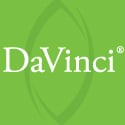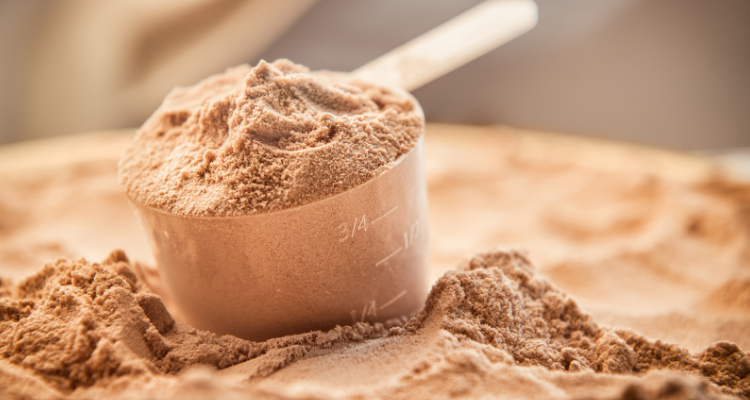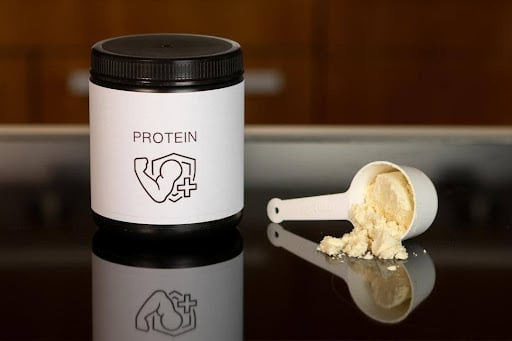
Protein powders are among the healthiest and most versatile options in the supplement space. With considerably fewer carbohydrates and calories than a protein bar, powders are the most popular protein supplement for supporting muscle growth and recovery after exercise. But how is it made?
Understanding the manufacturing process can help retailers develop marketing strategies and arm consumers with the knowledge to make the best choices.
sources of protein powder
Powder supplements provide a high protein concentration, which has various potential benefits, such as promoting muscle growth, aiding normal recovery, and helping with weight management.
Although anyone conscious of their nutrition might take protein powder, it is most popular among athletes, bodybuilders, and fitness enthusiasts.
Typical protein sources include:
- Whey
- Casein
- Soy
- Pea
- Rice
- Hemp

sourcing the protein
Powder supplements are typically sourced from animal- or plant-based proteins. High-quality sources ensure a better amino acid profile and purity, leading to more effective muscle synthesis and recovery.
Animal-based proteins
These include whey and casein, both derived from dairy. Whey protein is the most popular because of its rapid absorption and rich amino acid content. On the other hand, casein-based options digest slowly, which is ideal for nighttime consumption for a sustained protein release.
Plant-based proteins
Plant-based protein options derived from soy, pea, hemp, or pumpkin seeds cater to vegans and anyone with dairy intolerances. Remember, some plant-based options don't offer complete proteins, making it necessary to combine two or more to receive all nine essential amino acids.
Protein Powder manufacturing
There are several stages to protein powder manufacturing:
- Extraction: To separate the protein from whole foods, manufacturers use techniques such as filtration, purification, and adding enzymes, heat, or acid.
- Protein concentrate: Extraction leads to a protein concentrate, which contains approximately 60% to 80% protein mixed with the remaining fats and carbohydrates from dairy or whole foods.
- Protein isolate: For a purer powder, protein concentrate can be processed to extract and isolate the protein, resulting in 90% to 95% purity.
- Drying and pulverizing: The protein is then dried and turned into a fine powder.
- Flavoring: The final stage is adding flavorings and additives to enhance taste and mixability.
protein powder testing & quality control
Now that we know how protein powder is made, the next step is quality assurance.
Manufacturers must undergo rigorous testing protocols and follow health and safety standards to check for contaminants, verify protein content, and assess amino acid profiles. Third-party validation certifications, such as NSF, is another way companies can ensure the highest standards in their products.
Packaging and Branding
Packaging options for protein powder include tubs (of various sizes), sachets, and resealable bags.
Labeling is also critical for all protein powder supplements. Regulatory statutes require companies to provide nutritional information on the label, including ingredient lists and potential allergen warnings.
Companies using private-label supplements can also emphasize unique selling points to enhance product appeal and customer loyalty. For example, highlighting things such as source quality, flavor variety, or targeted health benefits in packaging and branding can help differentiate a product in the competitive market.
Trends in Protein Powder Manufacturing
Technological innovations impact every manufacturing sector, and protein powder is no different.
As trends toward healthy eating and personalized nutrition continue, the popularity of plant-based proteins is on the rise, and the market has already responded with innovation in developing new textures and flavor profiles.
As filtration and purification techniques evolve, they will lead to purer protein isolates, making protein powder supplements even more efficient in nutrient delivery.
Challenges and Opportunities for Retailers
A typical challenge for retailers selling protein supplements is the range of consumer preferences and dietary requirements. Although you can't meet every customer's need, offering different types of protein powder, varying in source, flavor, and concentration level, is a good idea.
Retailers must also stay updated on the regulatory landscape, ensuring their products, marketing, and labeling all comply with industry standards.
Finally, there's the issue of competition. Regardless of which market research report we consult, they all project the same outcome: The protein supplement market will grow in the next 10 years.
While that's good news for health and wellness retailers, it could also lead to saturation, making it challenging for companies to jostle for market share or maintain customer loyalty. In this context, retailers should consider differentiating their brands, emphasizing unique product features, and establishing a company identity.
Private labeling protein supplements is a great option for brands that want to sell a proven, top-selling formula without worrying about consumers looking for the same product offered by other retailers. Your brand is on the packaging, enabling you to build loyalty among customers.
From sourcing and extraction to quality control and packaging, making protein powder involves carefully controlled steps to ensure a high-quality product. And understanding the manufacturing process is something retailers can leverage for their business.
The more you learn about health supplements, the better you can answer questions and help customers find optimal products.
With your private label protein powders and other private label supplements, knowing where your products come from and how they're made will help you establish trust and credibility with consumers.



















